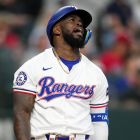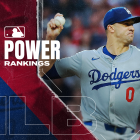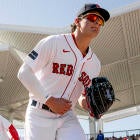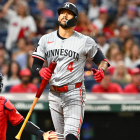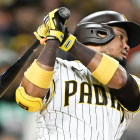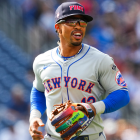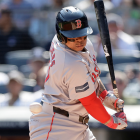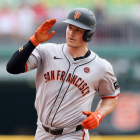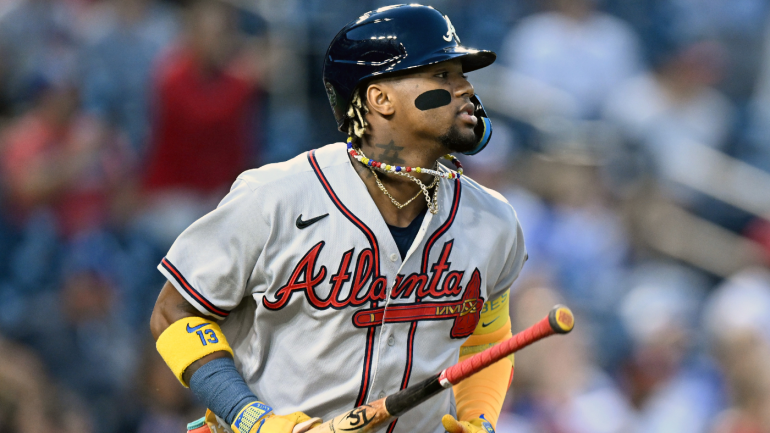
Unlike several other major professional sports leagues, Major League Baseball annually has two Most Valuable Player awards. It probably seems funny to NFL fans to picture an AFC and NFC MVP just like it would be to have an East and West MVP in the NBA. Over here in baseball, though, that's just how it's been done for decades.
The quick history lesson here is back when the Most Valuable Player award started, the two leagues (American and National) functioned independently until the World Series. There was no interleague play, there were AL and NL umpires and the league offices operated on their own, for the most part. As such, it made total sense to have separate awards for each league. How could anyone actually compare players from two totally separate leagues?
Now that we have fully integrated interleague play and have for years, it would be fine to have just one MVP, but I'm guessing we'll never change due to history (it's tougher to compare something like "most MVPs" across generations when you consolidate two MVP awards per year down to one, for example).
Still, what if we did in 2023? I think there would be heated arguments right now between three players: Mookie Betts, Shohei Ohtani and Ronald Acuña Jr. All numbers are heading into Tuesday, though Ohtani's are final due to his injuries. I'll list their stats so you can look at them all in one place while also discussing the merits of the respective candidacies.
Mookie Betts, Dodgers
Mookie has played in 146 of his Dodgers' 155 games. He's hitting .309/.410/.590 (167 OPS+), ranking sixth in average, fourth in on-base percentage and fifth in slugging. He's recorded 174 hits (sixth in the majors), scored 125 runs (tied for second), hit 39 home runs (sixth), recorded 40 doubles (fourth) and driven home 105 runs (tied for fifth) despite being a leadoff hitter.
On baserunning, he's stolen 13 bases in 16 tries and is above average at run scored percentage while hovering around average at extra-bases taken.
Defense matters here. Betts is one of the best defensive right fielders in baseball, but he's also helped his team out when it's had a depleted infield by playing second base for 450 innings (he's taken 57 starts there!) and shortstop for 98 innings. He's rated out as adequate or better at short and great at second.
The defensive scoring has pushed Betts to an 8.1 to 8.0 lead over Acuña in Baseball-Reference's version of WAR. On Fangraphs it's Betts with an 8.2 to 7.9 lead.
For those who want to attach a team element here, due to the word "value" ("how valuable could he be if his team is bad?"), Betts is playing on a division champion that might win 100 games.
On that front, in zeroing in on "clutch" stats, Betts has hit .383/.497/.661 with runners in scoring position, .319/.441/.638 with runners in scoring position and two outs and .333/.454/.623 in late-and-close situations.
I still suspect Mookie would finish third.
Shohei Ohtani, Angels
With Ohtani, it's all about his teammates, right?
Anyone who wanted to argue that Ohtani's injuries should prevent him from winning the award on a games-played basis has to be ignoring the two-way stardom. Sure, Ohtani will finish with 135 games played, but he took 599 plate appearances as a hitter and pitched 132 innings. The shortfall in offensive games is easily accounted for with the 23 starts on the mound.
Ohtani was 10-5 with a 3.14 ERA, 1.06 WHIP and 167 strikeouts in 132 innings. That's All-Star-caliber work on the mound for close to 3/4ths of a season for regular starting pitchers.
Ohtani also hit .304/.412/.654 (184 OPS+), leading the majors in slugging, OPS and OPS+. He's second in OBP and eighth in average. He recorded 151 hits, 26 doubles, eight triples (tied for fifth in the majors), 44 homers (fourth), 95 RBI and 102 runs (11th). He stole 20 bases in 26 tries and was slightly above average at taking the extra base.
There isn't really a defensive score for Ohtani, as he was DH when not pitching. Generally speaking, that's a negative, but his work on the mound provides more value than any single defender can.
In all, Ohtani leads both version of WAR by a lot. It's 10.1 on Baseball-Reference and 9.0 on Fangraphs.
Of course, there's the "value" component here. Ohtani's Angels were in the race until the trade deadline and then completely fell apart. They are 70-87 and 16 games behind the final AL playoff spot. They haven't been in the race for weeks. The Angels went 62-73 when Ohtani played this season and are, so far, 8-14 when he doesn't.
If you want to use those figures to determine Ohtani's exact value, be my guest.
There shouldn't be much divide here, though. If you believe the most valuable player is the best player, Ohtani should win this fictional and hypothetical MVP. If you believe "value" means a player has to be part of a team that's at least on the cusp of contention to be valuable, then Ohtani is eliminated from the conversation.
Ronald Acuña Jr., Braves
We know the team element isn't a problem for Acuña. His Braves have won 100 games and are going to finish with the best record in baseball. He's been their best player, even if he's had plenty of help with a loaded lineup. The best player on the best team is always a popular place to start in MVP discussions, but Acuña's case is an individual one, not a team-driven one.
No player in baseball history has ever had a season with 30 home runs and 60 stolen bases. Someone could reply that those are arbitrary benchmarks and that's fair, but he's up to 40 homers and 68 steals. He's blown everyone else in history away with his power-speed combo.
Acuña is hitting .336/.415/.595 (167 OPS+). He trails only Ohtani in OPS+. He's second in average to a guy who flirted with .400 for a good portion of the season. He leads in OBP. He's fourth in slugging. Those rate stats are amazing and his counting stats match up, as he has 210 hits (giving him the lead by seven), 34 doubles, four triples, 40 home runs (fifth in the majors), 143 runs (first by 18!), 101 RBI (tied for 10th despite being a leadoff hitter) and those 68 stolen bases (first by 17).
For those curious, Acuña has only missed three games and the Braves went 1-2 without him. They are 99-54 with him.
Did you also know that Acuña has a whopping 714 plate appearances but has only struck out 81 times? Only Marcus Semien has gone to the plate more times this season, but of 1,444 players to have taken a plate appearance, Acuña is tied for 223rd in strikeouts.
He's also well above average in taking the extra base and scoring runs once he's on base. And, again, he leads the majors in on-base percentage, so he's on a lot. That'll explain that absurd lead in runs scored.
Acuña is outscored defensively by Betts, rather significantly with some stats. That explains Betts' small lead in both versions of WAR. WAR is but one stat, however, and it isn't supposed to be used on its own like this. That is, if there's a 0.1 difference, there's no sabermatrician anywhere who would say the MVP discussion is over based only on WAR.
Acuña also leads Betts in win probability added (6.1 to 5.0). Acuña hits .306/.412/.537 with runners in scoring position, .327/.453/.539 with runners in scoring position and two outs and .324/.375/.460 in "late and close" situations.
One thing in the favor of Acuña here is the historic aspect to his season. In dealing with the two-way prowess of Ohtani, I've seen people in the last two seasons say something like "it would take a historically great season to top him." There wasn't one in 2021. In 2022, Aaron Judge had one and won the hardware. This time around in the AL, there isn't one, so Ohtani will win it. If this were an all-MLB award, though, Acuña's year is historically great, right?
I think Acuña would probably win this honor. Should he? It's a fun argument.









